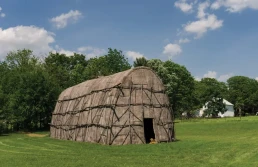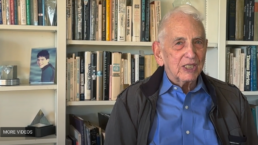There was nothing simplistic about moving — in many ways back to earlier traditions — to a system of governance not imposed by a small elite so much as participated in by an engaged population in which all were expected to fulfill responsibilities and to reach a consensus on decisions.
By David Swanson
Monday was Indigenous People’s Day, when much of the United States celebrates a murdering, enslaving, profiteering, imperialist Italian sailor mercenary and missionary who couldn’t tell one continent from another, wisdom from ignorance, or value from waste.
I was born and raised and have mostly lived in the eastern United States, and yet when I hear someone here refer to “how people lived several hundred years ago,” they almost always mean how people lived in Europe several hundred years ago. I see great value in studying European history and that of the whole globe. But I have no particular connection to or heritage from medieval Europe to the exclusion of connection with the people who lived on the same land I do.

Apart from the staggeringly stupid factors of what color my skin is or who my particular great-great-great-great grandparents were, there is simply no reason for me to talk about human history as flowing back through time to British colonists, and then back across the ocean on their ships, and then back through Europe to the days of Neanderthals. Most of human history has happened nowhere near where I live at all. But the people for whom many of the locations around me are named, the people whose paths became the roads I walk and drive on, the people who developed much of the knowledge of local plants and animals where I live, the people whose descendants’ oral histories have outlasted the plowing under of the mounds — they were people I think we still have much to learn from.
About a thousand years ago, as the world warmed, some of the peoples of North America chose to develop far greater surpluses of agriculture, far larger cities and pyramids, and — to varying degrees in some of those same places — far more hierarchical and unequal and violent societies. When the world began cooling, some 750 years ago, a trend developed of moving to less hierarchical societies, of living in smaller cities and towns. The largest cities we know of in places we now call Arizona, Illinois, and Alabama were abandoned by 1400. Columbus would not be born for over 50 years when Turtle Island was going through a democratic revolution.
In the past 200 years or so (though much less in the last 50), great effort has gone into pretending that the Indigenous peoples of North America were too simplistic to have ever built cities. The fact that they had built cities that rivaled the world’s greatest cities at the time does not address the most egregious lie here. The worst lie here is that living without major cities or monuments is simplistic, or that it hadn’t been chosen by people who had learned that oligarchy was not what they wanted. This is a bias that plagues history and archaeology worldwide, of course, as focus is easily drawn to what actually exists in physical remains, which tends to be the monuments and writings of kings and emperors and their Marco Rubios.
There was nothing simplistic about moving — in many ways back to earlier traditions — to a system of governance not imposed by a small elite so much as participated in by an engaged population in which all were expected to fulfill responsibilities and to reach a consensus on decisions. Just as carefully maintained woods and groves cannot be dismissed as simplistic gathering or hunting in the wilderness, just as sustainable three-sisters agriculture cannot be scorned for its failure to destroy the soil, and just as a way of life cannot be rejected as savage by a society whose members tended to prefer joining it when given the chance, so more democratic governance cannot be taken as a sign of inferiority at the same time that we champion either (depending on political party) roving bands of masked thugs kidnapping people or a veneer of elections overlaid on oligarchy as the height of civilization.
The Bill of Rights that is being shredded, and the European Enlightenment that is apparently regretted in many quarters, owe a great deal to the Indigenous people of North America. Europeans learned about Native Americans through European colonies, including through debates and discussions with them, written works and exchanges, and public and private seminars, both in the Americas and in Europe. The Indigenous critique of European society included its lack of freedom, equality, or fraternity, its shocking willingness to leave people poor and suffering, and its obsession with wealth at the expense of time and leisure. This critique was the origin of a great strain of thought in the European Enlightenment, to which a major response was the Rousseau-Hobbesian infantilization of the people who had just made a wise, coherent, and articulate critique, as well as the invention of false claims of the necessity to sacrifice freedom for safety, of the supposed decrease rather than increase in hours worked in shifting to a European way of life, etc.
Prior to the critique made by the residents of Turtle Island, European intellectuals didn’t bother to make excuses for inequality as an inevitable sign of progress, because the notion that there was anything wrong with inequality hadn’t much occurred to them. Many of the societies that were savagely attacked in the creation of the United States were mutually recognized by both themselves and Europeans as free in comparison with Europe and its colonies, the only dispute being whether freedom was a good thing or not. Today, the Native Americans have basically won the rhetorical debate, while the Europeans have won the lived reality. Everybody loves freedom; few have it. Although if you utter the phrase “defund the police” you may discover vibrant remnants of those Jesuits who admitted that Wendat people had much less conflict than existed in France despite having to obey no laws — and yet denounced that success, as a matter of principle.
Horrified as many of us may be today of a candidate for Mayor of New York City proposing to make buses free or housing affordable, the practice of maintaining rough equality of wealth in societies of significant size has a much longer history on the land we stand on than we usually bear in mind. The people who lived on this land didn’t suffer a “collapse” of civilization, but chose to not trust oligarchs, overlords, and powerful priests. They chose to replace palaces with meeting houses and public squares. They chose to create roles, structures, ceremonies, and practices that would allow people to govern themselves. This was not without deep flaws, and it was done in a very different world from ours, but it was thoroughly and effectively done. A culture was developed in which prestige came from sharing rather than from hoarding.
Montaigne recounted a conversation in France between a number of Native Americans and King Charles IX, in which they said, perhaps to his discomfort, “that they had observed that there were amongst us men full and crammed with all manner of commodities, whilst, in the meantime, their [fellows] were begging at their doors, lean and half-starved with hunger and poverty; and they thought it strange that these necessitous [ones] were able to suffer so great an inequality and injustice, and that they did not take the others by the throats, or set fire to their houses.” This was over 200 years before the French revolution.
Recent Posts
As Security Council Stalls, There Are Other Ways to Stop U.S.-Israeli War on Iran
March 3, 2026
Take Action Now A “Uniting for Peace” resolution in the UN General Assembly can counter the Security Council’s failure to act.By Marjorie Cohn,…
States Can Block the Paramount-Warner Deal
March 3, 2026
Take Action Now But thanks to some clever maneuvering, they are already running out of time.By David Dayen, The American Prospect What started as…
Congress, Do Your Job and End This Illegal War of Aggression By The U.S. and Israel
March 2, 2026
Take Action Now Congress must assert its Constitutional authority over matters of war and peace against an out-of-control, rogue president and…
Daniel Ellsberg Speaks to Us as the War on Iran Continues
March 2, 2026
Take Action Now Ellsberg’s voice is back via a compelling new book. “Truth and Consequence,” being published this week, provides readers with his…




